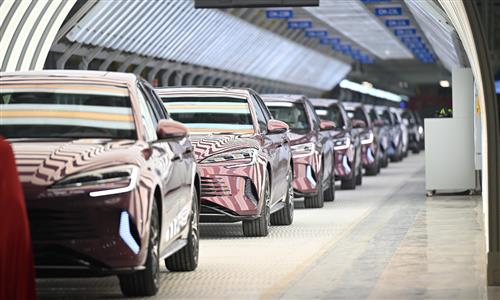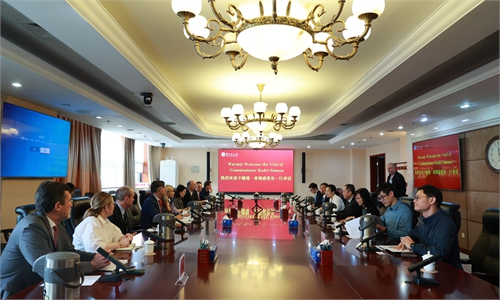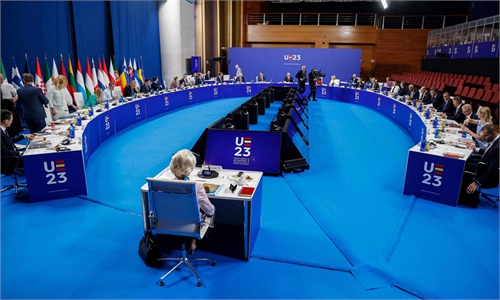China-EU strategic dialogue ‘chance to consolidate trust’
Candid, productive talks can dispel misunderstanding, smooth ties: expert
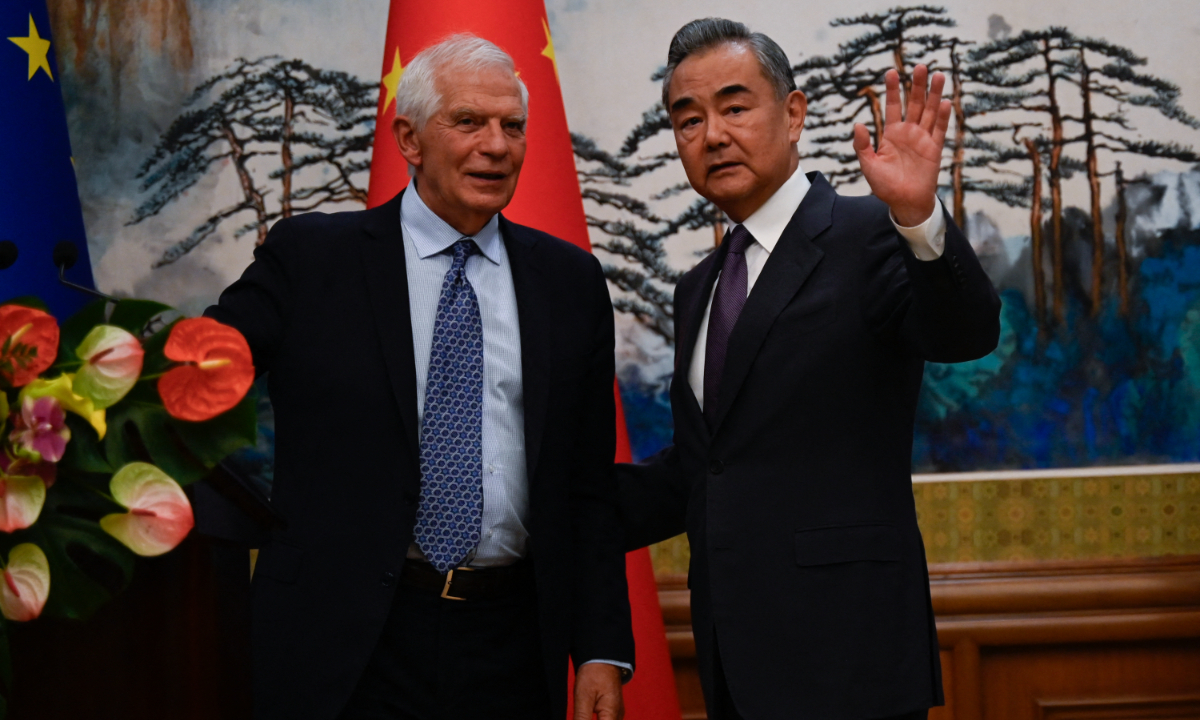
China's Foreign Minister Wang Yi and EU High Representative for Foreign Affairs and Security Policy Josep Borrell attend the China-EU High-Level Strategic Dialogue at the Diaoyutai State Guesthouse in Beijing on October 13, 2023. Photo: AFP
Senior Chinese diplomat Wang Yi on Friday met with Josep Borrell, High Representative of the European Union for Foreign Affairs and Security Policy and Vice-President of the European Commission, during his long-awaited China visit, which had been postponed twice.
Borrell's visit along with frequent China-EU interactions in recent months has created an opportunity for both sides to better understand the other's stance, manage differences and seek common ground, analysts said.
It is hoped that through such candid, productive communication, rational and pragmatic voices and forces in the EU can be amplified, which will not only expand the bloc's room for maintaining autonomy, but also smooth China-EU relations.
Wang and Borrell co-chaired the 12th China-EU High-Level Strategic Dialogue in Beijing on Friday.
Foreign Minister Wang Yi, who is also a member of the Political Bureau of the CPC Central Committee and director of the Office of the Central Commission for Foreign Affairs, said there is no geopolitical conflict or major conflicting interests between China and Europe.
Governments should create a fair environment for businesses and provide positive expectations. Economic issues should not be politicized, and both sides should jointly uphold free trade and maintain the principle of fair competition, Wang stressed.
China attaches great importance to its relationship with Europe and regards the EU as an important and independent pole in a multipolar world. The Europe relationship has its own internal logic and is not influenced or interfered with by third parties.
We need to make sufficient preparations for the leaders' meeting by the end of the year, promote dialogue and cooperation… properly handle differences, remove obstacles to cooperation, and ensure the healthy and stable development of China-EU relations, Wang noted, calling on the two sides to uphold multilateralism, jointly address international and regional hotspot issues, and inject more stability and certainty into the world.
Borrell said the European Union values its relationship with China and is committed to developing a constructive and stable EU-China relationship.
As the most open economy, the EU believes that economic cooperation between the EU and China is in the mutual interest of both parties. The EU has no intention of closing its doors to China, engaging in a trade war, or restricting China's development. On the contrary, the EU welcomes China's prosperity and stability, Borrell said.
The EU looks forward to strengthening cooperation with China in areas such as climate change and seeks to establish a more balanced and equal economic and trade relationship in order to accumulate tangible achievements for EU-China leaders' meeting and provide a fair and just business environment for enterprises, the foreign policy chief said.
The two sides also exchanged views on the Ukraine crisis and the Israeli-Palestinian conflict, agreeing on pushing forward political solutions to these issues.
Wang Yi stated that only through negotiations can the Ukraine crisis be resolved. China will not give up on urging peace and dialogue, and will always stand on the side of peace and dialogue. China and Europe should jointly create conditions for a political solution and promote peace and stability in Europe.
Regarding the Israeli-Palestinian conflict, Wang Yi emphasized that China opposes attacks on civilians and condemns actions that violate international law. The immediate priority is to prevent the situation from escalation and avoid further deterioration, especially the occurrence of a serious humanitarian disaster.
All parties involved have a responsibility to cool down the situation, form international consensus and binding measures on the implementation of the "two-state solution," and achieve peaceful coexistence of Israel and Palestine, Wang said.
On the Palestinian question, China will continue to stand on the side of peace, justice, international law, the common aspirations of the majority of countries, and the conscience of humanity, Wang stressed at the joint press conference with Borrell after the dialogue.
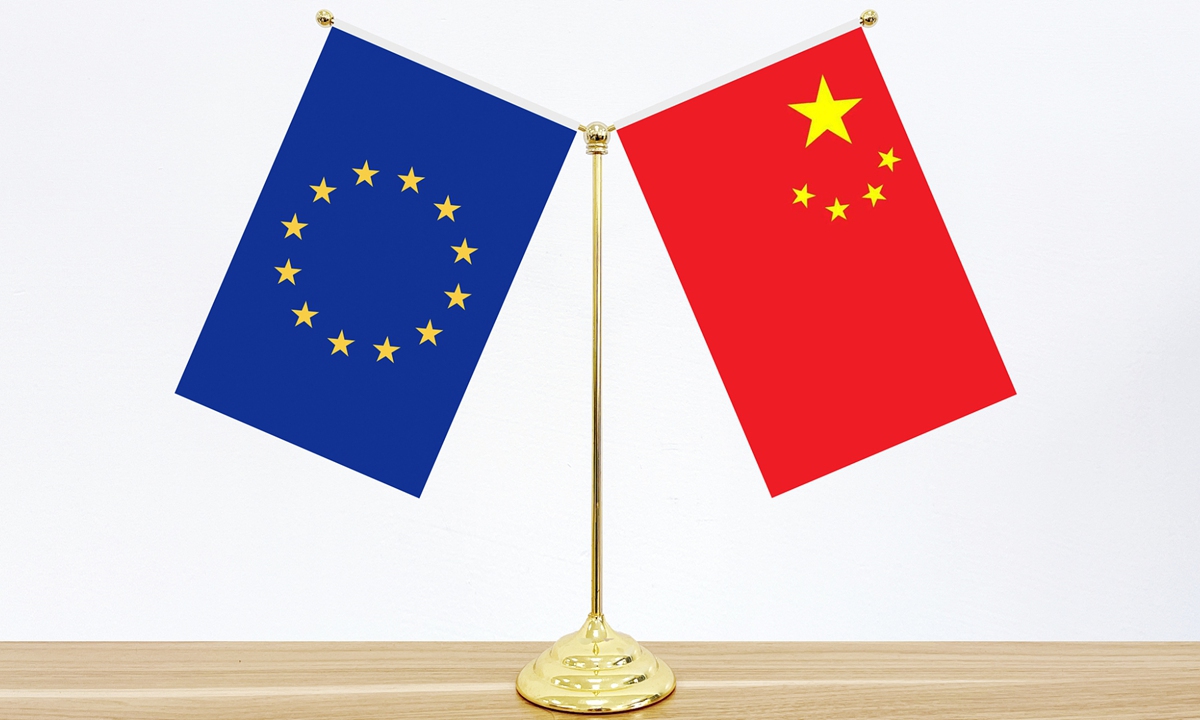
China EU Photo: VCG
Dispelling misunderstandings
Speaking at Peking University earlier on Friday, Borrell, who is paying a visit to China from Thursday to Saturday, said, "Trust is at the core of any human relationship, and... common trust [between China and the EU] has been eroded," France24 reported. "We have to work to rebuild this trust," Borrell said, citing the trade imbalance between the bloc and China and requiring wider access to the Chinese market for European companies.
On the Russia-Ukraine conflict, which has made the EU suffer, Borrell said, "We are not asking China to adopt the same standpoint as the EU, but we consider it essential that China makes a major effort to convince the people of Ukraine that China is not Russia's ally in this war."
From Borrell's remarks, observers saw some typical misunderstandings about China from the EU, but they can be dispelled through candid, constructive communication.
Long Jing, deputy director of the Center for European Studies, Shanghai Institutes for International Studies, was among the academics who communicated with Borrell during his stay in Shanghai. Long told the Global Times on Friday that many debates in the EU on China and their decision-making concerning China lack voices from China, be it from the business community or from academia.
After visiting the institute, Borrell posted on X (formerly Twitter) "My visit to China is also to listen to Chinese views. Our exchange shows that this discussion must continue."
Long saw Borrell as representing people in the EU who hope the bloc and China can enhance cooperation, properly manage differences and realize peaceful coexistence despite differences in values and the Ukraine crisis overshadowing bilateral relations.
Through the China visit, Borrell sent an important signal that the EU hopes the relationship with China can overcome the perspective of the China-US rivalry and China-Russia partnership, according to Long.
"China should stop viewing its relationship with Europe through the lens of its rivalry with the US," Borrell said in an interview with the South China Morning Post (SCMP) on Thursday.
However, it is the EU that has failed to come up with a relatively independent and rational China policy, analysts said, and there are reasons behind this.
Feng Zhongping, director of the Institute of European Studies at the Chinese Academy of Social Sciences, told the Global Times that EU strategic autonomy does not mean keeping the same distance between China and the US, considering the constraints of the transatlantic alliance.
China has no fundamental conflict with the EU, and the latter should not mistake China's stance on the Russia-Ukraine conflict, Feng said, adding that China will never be a security threat to Europe.
The EU believed that relying on the US was the only solution to the Ukraine crisis, and has paid a high price for it. It is important for the bloc to take the initiative and secure its autonomy on broad topics rather than willingly yield its right to decide-making to others, analysts said.
Another major hurdle between China and the EU lies in trade frictions. Bloomberg described the EU's top diplomat's trip as a "delicate task", as he has to "push back against Chinese subsidies and prevent the $900 billion relationship from imploding into a trade war".
China's rise in industry has prompted concern and a sense of insecurity in the EU, for example in new-energy vehicles, Jiang Feng, a research fellow at the Shanghai International Studies University, told the Global Times Friday.
However, this anxiety should not be misused by anti-China hawks to justify seeing China as a systemic rival, Jiang stressed.
China and the EU should have fair and healthy competition and seek common growth through diversified competition, and the two sides have great potential in joint exploration of third-party markets, Jiang said.
Analysts shared the consensus that trade frictions can and should be negotiated through many bilateral mechanisms, and both sides should be very careful in defining the other as a risk, a challenge or even a threat, otherwise trust will only be further eroded, and the relationship, if poisoned, will leave little room for areas of cooperation.
US media has spared no efforts exaggerating the divergence between China and the EU. VOA reported that Borrell's visit came at a time when China-EU divergence is greater than ever.
A proper China-EU relationship is by no means in the US' interests, and amid complex and intertwined economic and geopolitical "interest nets," the EU is encouraged to demonstrate vision and wisdom to fight for its substantial and sustainable benefits, analysts said.
China and the EU and its member states have had pragmatic dialogues on digital, financial and many other areas in past months, and many bilateral mechanisms have recovered after a long hiatus.
Borrell's long-awaited visit and those interactions demonstrated a rational, pragmatic attitude toward China in the EU and their willingness to have dialogue, policy coordination and cooperation with China, Long said, and it is hoped that there will be more exchanges and better mutual understanding to pave the way for stable, healthy China-EU relations.
